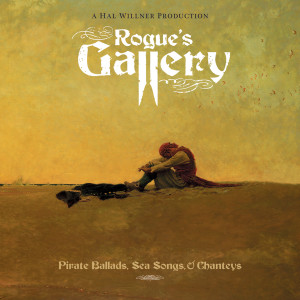 I’ve never considered myself a particular fan of sea chanteys, but this collection just may make a convert of me. When I read the press release from Anti- earlier this year, I was immediately intrigued by the project, not least because of the broad and deep lineup of talent involved.
I’ve never considered myself a particular fan of sea chanteys, but this collection just may make a convert of me. When I read the press release from Anti- earlier this year, I was immediately intrigued by the project, not least because of the broad and deep lineup of talent involved.
The project grew out of the fertile minds of Johnny Depp and Gore Verbinski, director of Depp’s two Pirates of the Caribbean films. The two envisioned an album of pirate songs and sea chanteys (and I suspect financed it), and shanghaied well-known music producer Hal Willner to bring it to fruition.
What Willner came up with is a two-CD set containing 43 songs, by musicians young and old, household names, and obscure but up-and-coming ones as well. I suspect many people will be attracted to it the way I was by the presence of talent ranging from Bono and Sting to Baby Gramps, Jolie Holland and Teddy Thompson. Lou Reed and Nick Cave. Richard Thompson, Loudon Wainwright III and Bryan Ferry. Lucinda Williams and Bill Frisell. And three or four stellar backing bands, who also sometimes step into the spotlight themselves.
This set contains mostly chanteys, pirate ballads and sea songs, all distinct sub-genres. The musicians have taken more or fewer liberties with them, as is their wont. Some are played fairly straight, with traditional acoustic instrumentation and straightforward vocals; others are rocked-up with electric instruments, or have prog-rock elements like synthesizers, or various kinds of post-modern rock effects. I’ve read critics who say the songs are “too folked-up,” and others who object to any modernization of them, so I guess the producers must be doing something right to be criticized from opposing camps.
The problem with reviewing it is, where to start?
At the beginning, I guess. Pacific Northwest legend Baby Gramps kicks things off with a seven-minute take on “Cape Cod Girls,” a chantey of the first order. He’s backed by a band I’m not familiar with, Akron/Family, plus Northwest jazzman Frisell on guitar, as he sings in a voice that descends regularly into a kind of overtone singing. Gramps has another track on the second disc, the only original song in the set, one called “Old Man of the Sea,” with a Hawaiian-type plucked guitar lead and a refrain of “If I were the old man of the sea, I’d bathe the lovely mermaids…”
Some of my favorite tracks are those by the Carthy family, appearing here in several guises. Eliza Carthy, backed by a big band and chorus (which includes Robyn Hitchcock among others), sings and plays violin on the chantey “Rolling Sea”; Martin Carthy & the UK Group (basically Waterson:Carthy with friends) follows that with “The Mermaid,” a trad ballad accompanied only by frame drum; and “Martin Carthy & Family” sings “Hog Eye Man,” about a girl whose family disapproves of her love for a man who owns a lowly barge.
Another favorite is Wainwright’s version of “Good Ship Venus,” which has to be the filthiest song I’ve ever heard. It’s basically a set of obscene limericks strung together, and sung with straight face by Loudon to great effect. He also does a nice job on the traditional ballad “Turkish Revelry,” about a young sailor who is wronged by a ship’s captain — a common theme. Loudon’s son Rufus is joined by his auntie Kate McGarrigle on the chantey “Lowlands Away,” hard by Teddy Thompson’s rendition of “Sally Brown,” in which he sounds more like his father than I’ve ever heard. Speaking of Richard, he beautifully renders “Mingulay Boat Song,” one you’ll probably recognize when you hear it.
Jolie Holland sings probably the most modern song, “The Grey Funnel Line,” the lament of a sailor in the WWII-era British Navy which was earlier recorded by June Tabor and Maddy Prior on their Silly Sisters album. Actor John C. Reilly turns in two charming pieces, “My Son John” and the drinking song “Fathom the Bowl.”
The offerings from some of the A-list singers are among my least favorites, with the possible exception of Sting’s “Blood Red Roses,” backed by pretty much the same musicians as played with RT. Sting’s other track, “Shallow Brown,” has him singing in a melodramatic low register that comes across like Professor Higgins teaching Eliza to say “how now brown cow.” Bono typically milks his song, “A Dying Sailor to His Shipmates” for all it’s worth and then some, and Lucinda Williams similarly moans her way through “Bonnie Portmore.” I’ve never heard a Nick Cave song I liked, and his off-key renditions of “Pinery Boy” and “Fire Down Below” didn’t change my mind — although his fans will probably enjoy these. David Thomas (Pere Ubu) typically deconstructs his contributions: “Dan Dan” is sung as though by someone with a lungfull of helium, and let’s just say that his “Drunken Sailor” is a far cry from the version sung by Miguelito Loveless on Wild Wild West, which is where I first heard it. Lou Reed shows Cave and Thomas how to deconstruct a song and still have it make sense, with his chilling “Leave Her Johnny.”
There are lots more songs about hardship on the seas, women virtuous or whorish who all seem to be named either Sally or Nancy, bad food, mean captains and storms and other disasters. And a second volume is probably in the works. All in all, it’s a splendid set of recordings. It doesn’t all work to my satisfaction, but with 43 tracks, there’s something here to please everyone and piss everyone off, probably. Well done!
(Anti-, 2006)
